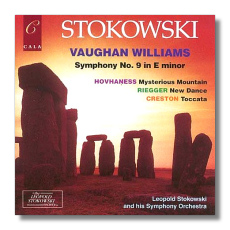
The Internet's Premier Classical Music Source
Related Links
- Latest Reviews
- More Reviews
-
By Composer
-
Collections
DVD & Blu-ray
Books
Concert Reviews
Articles/Interviews
Software
Audio
Search Amazon
Recommended Links
Site News
 CD Review
CD Review
Leopold Stokowski Conducts New Music

- Ralph Vaughan Williams: Symphony #9
- Wallingford Riegger: New Dance
- Alan Hovhaness: Symphony #2 "Mysterious Mountain"
- Paul Creston: Toccata
Leopold Stokowski Symphony Orchestra/Leopold Stokowski
Cala CACD0539
If you are looking for a recording of these pieces you are obviously off the beaten track. Stokowski was famous for programming and recording 'new' music and this concert is a perfect example. It was part of a program sponsored by the Contemporary Music Society which was created by Oliver Daniel. Stokowski was originally going to peform Shostakovich's 11th Symphony but changed his mind when he heard of Vaughan Williams' death. Both had attended the Royal College of Music at the same time and remained friends. The notes for the disc indicate they were fellow-students but in Oliver's book Stokowski says that Vaughan Williams was a teacher. Whatever the case, over the years Stokowski programmed and recorded much of the Vaughan Williams' music.
Vaughan Williams' own discussion of the 9th Symphony is both interesting and amusing. He writes, "The usual symphony orchestra is used, with the addition of three saxophones and flugelhorn. This beautiful and neglected instrument is not usually allowed in the select circles of the orchestra and has been banished to the brass band, where it is allowed to indulge in the bad habit of vibrato to its heart's content. While in the orchestra it will be obliged to sit up and play straight. The saxophones, also, are not expected, except one place in the scherzo, to behave like demented cats, but are allowed to be their own romantic selves." *
Despite efforts to the contrary, I don't feel I really 'understand' Vaughan Williams' 9th Symphony. It is darker than the 8th but not as violent as the 6th. It is brooding and mysterious as Stonehenge (whose picture adorns the cover). It is an enigma; the sax always makes me feel there is a sense of the absurd lurking about somewhere and it is clearly in the third movement. I like it and will keep studying it. In an attempt to place this performance (the U.S. première) in some kind of context I listened to Boult's recording on Everest. It taught me only that Boult doesn't seem to have the full gravity of the piece as does Stokowski.
Perhaps, however, I am not alone in my feelings about the piece. Steven Schwartz writes, "Of Vaughan Williams' symphonies, this is the hardest to know. On one hand I find the argument difficult to follow. On the other, the emotion runs deeper and wider than any other of the composer's symphonies… I find it hard to talk about this work, since I don't claim to understand it. However, I do find myself going back to it more than just about any other of the composer's major works." (From Classical.Net)
I would agree that this piece invites more listening. It is a demanding work but such close listening pays dividends. This recording belongs in any collections of the composer's works.
The other items on this release suffer from comparison with Vaughan Williams enigmatic 9th Symphony. It is not that they are bad, far from it. The "Mysterious Mountain" was commissioned by Stokowski and under his hands, especially with free-bowing, is easily the finest version I have heard. The other two items are more percussive and brass oriented. The Riegger also employs what sounds like a marimba and defintely a xylophone. It is energetic if not memorable. Creston's "Toccata" opens with cymbals, xylophone and brass. The saxophone also plays a part in the rousing piece. As I said, this not bad music but just doesn't measure up to the Vaughan Williams. Still, I am glad to have examples of their music… it adds to my conception of classical music.
The orchestra is excellent, hand-picked by Stokowski from among the finest players in New York at the time. This is no small band, like that used in the recordings he made for RCA around that time, but full and rich. The soloists are all excellent and clearly heard.
This disc is another fine contribution to the Stokowski legacy and that of Vaughan Williams with the other items as fine lagniappes.
* From Dr. Vaughan Williams' notes as cited in the Everest release.
Copyright © 2004, Robert Stumpf II




















